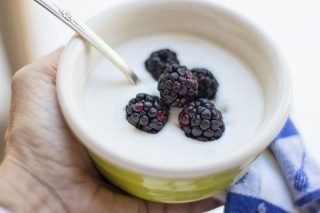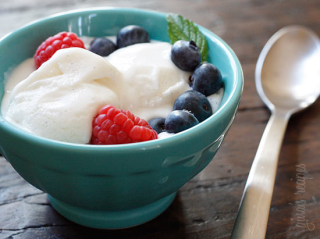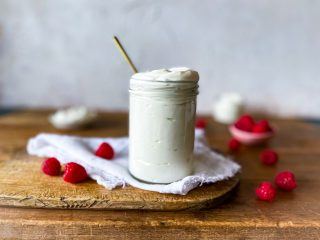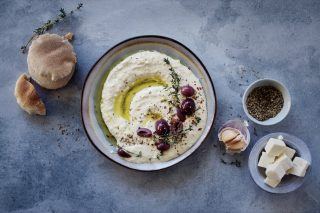Let’s face it, yoghurt is one of those happy healthy foods that give us all pleasure and it is so easy to include delicious and versatile yoghurt as part of our daily diet. Interestingly, research has shown that women who regularly consume yoghurt tend to make many other healthier eating choices, suggesting that eating yoghurt is a gateway to a better quality diet and a more optimal lifestyle.
Eating Yoghurt For An Active and Healthy Lifestyle
Yoghurt is a particularly nutrient-dense food providing high amounts of quality protein and bone-building calcium as well as potassium, phosphorus, magnesium, zinc and vitamins B12 and B2.  According to a 2013 Nutrition Research study, women who regularly consume yoghurt tend towards healthier eating in general and experience specific benefits including:
According to a 2013 Nutrition Research study, women who regularly consume yoghurt tend towards healthier eating in general and experience specific benefits including:
Lower risk of disease
Eating yoghurt is often associated with lower blood glucose and lower blood pressure, reducing the risk of developing chronic conditions such as diabetes and heart disease.
Filling the nutrient gaps
Daily consumption of yoghurt helps women to achieve their required protein intake, which increases during pregnancy and breastfeeding. Women who eat yoghurt regularly are also less likely to develop deficiencies in potassium, calcium, zinc and B vitamins.
Weight maintenance and appetite control

Low-fat-frozen-yogurt
Due to its quality protein, including yoghurt in meals and especially as snacks helps you to feel fuller for longer and can help to manage weight and control appetite.
Love yoghurt for your gut and immune response
“There’s an array of research that shows that the healthy bacteria, probiotics, in fermented foods like yoghurt improve the community of microbes in the gut, known as the gut microbiota.
Regular consumption of yoghurt can improve overall gut health and can contribute to a range of positive health benefits, such as reducing chronic inflammation, which is linked to diseases like diabetes and heart disease, and relieving gut discomfort”, says Maretha Vermaak, registered dietitian at Rediscover Dairy.
“Our gut microbiota is also pivotal to our bodies’ immune response and one of the best ways to support the immune system is maintaining a healthy gut.”
How yoghurt replenishes your body post-workout
There’s growing awareness that what you consume after physical activity matters. It might be surprising to some, but yoghurt is an ideal post-workout snack or drink.

Photo by Benjamin Klaver on Unsplash
High protein content helps to repair and build lean muscle and calcium protects your bone health, while potassium, phosphorus and zinc help tired muscles recover and can prevent muscle cramping.
If you don’t feel like eating after your workout, yoghurt is an excellent base for a healthy smoothie and it makes a great and refreshing frozen treat.
Loving yoghurt in many different ways
For many women, the sheer versatility of yoghurt is a great advantage. While it works well added to morning oats, cereals and fruits, it is far from limited to breakfast food.
It is ideal on its own as a quick, satisfying morning or afternoon snack; perfect for all-day smoothies on the go; delicious for a dip or as a spread or topping.
Yoghurt is also a common ingredient in main dishes from a variety of international cuisines and can be added to soups, stews, wraps, stir-fries, vegetable dishes and even home-baked goods.
Choose your yoghurt carefully
Not all yoghurt is created equal. Many yoghurt brands are laced with sugar and artificial ingredients. READ THE LABELS and go for plain yoghurt options. You can always add in fruit or honey to taste. Hidden sugar in foods, especially yoghurt can be bad for your health and wellness and cancel out any other goodness in this dish.
Yoghurt recipes
 Enjoy these yoghurt recipes, courtesy of Rediscover Dairy.
Enjoy these yoghurt recipes, courtesy of Rediscover Dairy.
Making my own yoghurt or amasi at home
You will need:
- Milk (any amount will work – best to use 1 litre at a time)
- Small tub of yoghurt/maas (100 ml – 200 ml)
- Clean saucepan
- Clean container (plastic or glass jars)
You can add the following for a thick yoghurt:
30 ml milk powder for every 500 ml milk (not creamer) or Gelatine (15 ml for every 500 ml milk)
Optional for flavour:
Chopped fresh fruit
Steps:
1) Clean your hands and cooking area.
2) Start by heating the milk (with the milk powder and gelatine if you like it thick) in a saucepan, until you start to see small bubbles on the side. Switch off the heat and remove it from the stove.
3) Wait ten minutes. Add a large scoop of any yoghurt/maas you have, and stir using a clean spoon.
4) Close the lid and leave in the saucepan for four to five hours.
5) After four to five hours open the saucepan, and give it a good gentle stir with a clean spoon. (You should see a white gel-like texture with some water on top. This is normal for good quality yoghurt with no thickener).
6) Pour into sterilised containers and cover.
7) Put into the fridge overnight.
8) Crack open your homemade yoghurt and enjoy with any toppings of your choice.
WHIPPED CREAMY FETA DIP
Yoghurt is a great substitute for cream and mayo, in many sauces. It adds that creamy zing!
Serves 6 | Serving size 80 g
INGREDIENTS
- 200 g (3-4 round circles) good quality feta cheese

- 110 g (100 ml) thick Greek-style yoghurt
- 1 heaped tbsp (40 g) mayonnaise
- 1 garlic (2 g) clove, minced
- 2 tbsp (24 ml) extra virgin olive oil
- 1 tsp dry oregano
- pinch of chilli flakes (optional)
- readymade pita breads
GARNISH
- fresh thyme olives
- olive oil black pepper
Method
- In a food processor, or in a bowl using an emulsion blender, combine the feta, yoghurt, mayo and garlic. Blend until smooth, scraping down sides as necessary.
- Add the olive oil and blend well. Do not over blend it so that it has a little textured.
- Add the oregano and chilli flakes. Give it one more quick mix.
- Decanter the whipped feta into a serving bowl and decorate with a splash of olive oil, fresh thyme and some olives.
Enjoy!
Nutrition Facts
Serving size: 80 g
Energy (kJ) 963
Protein (g) 8
Total Carbohydrates (g) 3.2
Fat (g) 20.9
Calcium (mg) 191
*Excluding the pita bread






![women [longevity live]](https://longevitylive.com/wp-content/uploads/2020/01/photo-of-women-walking-down-the-street-1116984-100x100.jpg)









